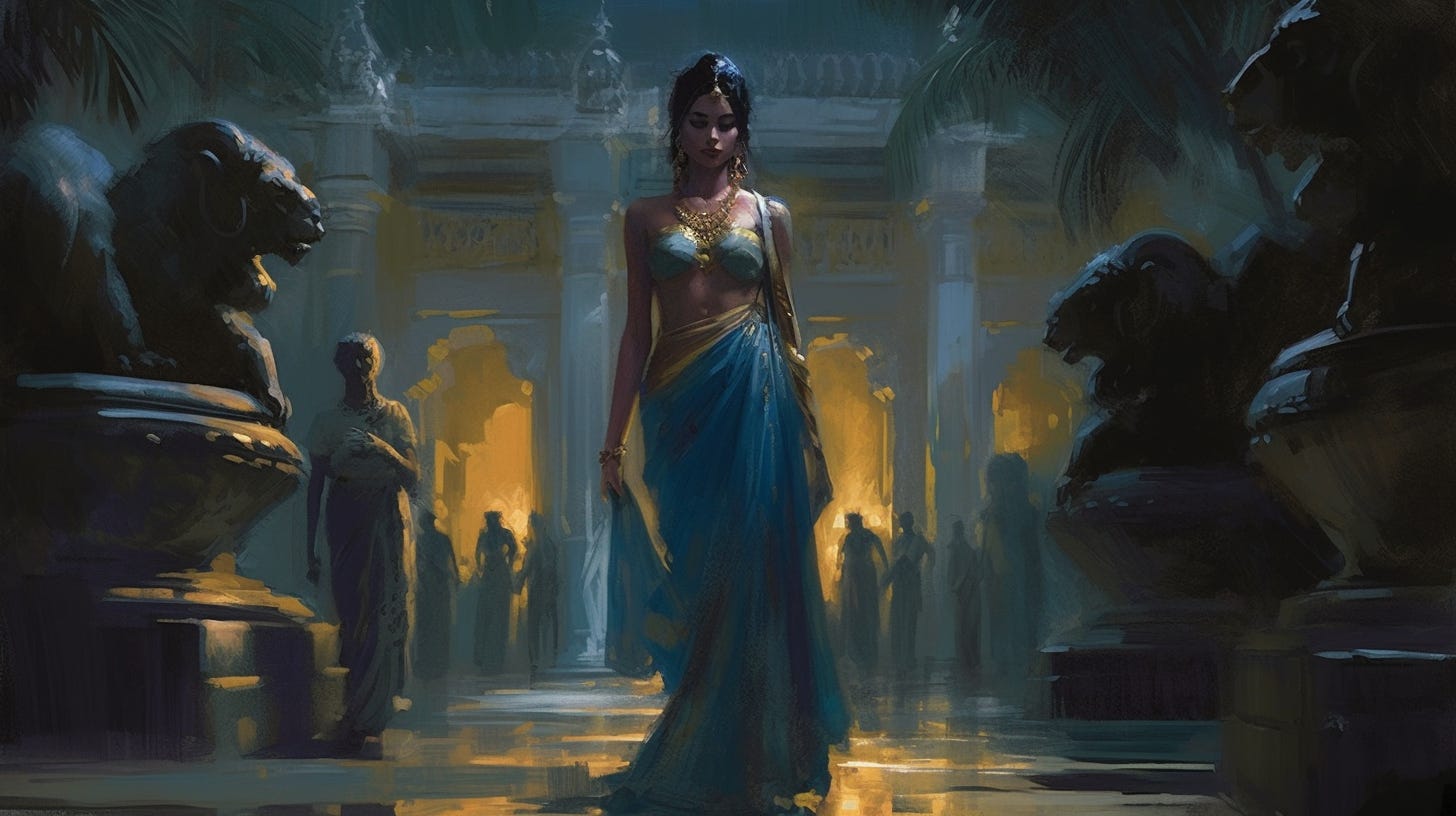Year 63, Kaliyuga
Present day
The day rolled on, and the men slowly but steadily made ready. Towards dusk, the moon rose in the sky, shedding a dim light across the land. The bell in the barracks rang once, its report loud and clear. Mārthāndan and Ripunjaya made their way to the palace, where Vagaimāran stood with his battalion chiefs near the gates. The captains of the ūsippadai had also arrived earlier, and Ilarāyan saluted Mārthāndan as he entered the compound. Together, they walked towards the large steps in the courtyard. A small company of soldiers stood awaiting them.
“All is ready, Māra?” asked Mārthāndan.
“Yes. I have already dispatched a five battalions to Solaipuram, and the rest of the men await us at the north-western gate, and the ūsippadai, at the western ramparts. They only await our arrival.”
They reached the steps, where the Kalikāman stood with a few noblemen and attendants beside a large stone pedestal with an ornate statue atop it. It was of a four-armed god seated on a peacock, carrying a large golden spear. Ripunjaya realised it was the idol of Skanda, the God of War. Kalikāman was offering flowers to the idol, and the people around him all had their hands clasped in silent worship. Mārthāndan, Vagaimāran and the rest of the chiefs also followed suit, and Ripunjaya try as he might, could not bring himself to pray. He still had a meagre distaste for deities, and he recalled his imprisonment with a slight shudder. It seemed ages ago, and Malasāra seemed like a distant dream. He shook his head to clear those thoughts, and watched as Kalikāman continued his ritual.
A herald quietly signalled the Prince’s arrival, and the soldiers all stood still, their spears upright. Aranvēndhan walked down the stone steps. A young maiden followed him. She was dressed in blue silk and wore simple jewels, and seemed to float rather than walk, her anklets on her bare feet making the faintest of sounds. Her long black hair was braided at the back, and a few tresses and caressed her face, like bees around a blooming flower. White malligai flowers adorned her head, their fragrance filled the cool nightly air. Her eyes twinkled like stars in a cloudless sky, she stood radiant like the full moon in the falling light. She slowly walked down the steps, and stood by her father. A small smile played on her lips as she clasped her hands in silent prayer.
Kalikāman made his offerings, and walked to the people gathered, a small silver lamp in his hand. He smeared sindhuram on the foreheads of Mārthāndan and Vagaimāran, and walking to the steps, raised the lamp high in the air for all to see. The soldiers in the courtyard raised their hands towards the lamp, in a gesture of worship. “Vettri namakke!” exclaimed Kalikāman in a low voice, and everyone bowed, and touched the ground near their feet. “Uyir Nākalam-ukke!” they all uttered in unison. They all quickly formed ranks and marched to the barracks, where their horses stood ready. Ripunjaya stood with Mārthāndan, who waited until the soldiers had left, and walked up to Aranvēndhan.
“Bless me, brother,” he said, offering his sword up to the Prince, and bowed. Aranvēndhan pulled him up by his shoulders, and embraced him. “I have no doubts in your victory, brother. It irks me that I too am not able to be at your side, and ride to battle like old times.”
“Pulithēvan is a rat, Vēndhā. Princes aren’t meant to catch rats. Leave that to me, I shall have Pulithēvan’s head by day rise.”
“Let this be an example to all other snakes at our borders. Godspeed, brother. May Skandan guide your path.” Aranvēndhan turned to the maiden standing next to him. “Come, Valli, let us prepare for Mārthāndan’s victorious return.” Together they walked up the steps and entered the palace, and the large doors shut behind them.
Mārthāndan bowed again, and walked to the idol, and offered a few flowers himself. Kalikāman placed his palm on Mārthāndan’s head and blessed him, and Mārthāndan touched his feet. Bidding farewell, Mārthāndan and Ripunjaya joined Vagaimāran and the men who were waiting with their horses.
Mārthāndan and Ripunjaya mounted their horses, and Mārthāndan signalled their departure. Silently, the soldiers on horseback slowly moved down the paved road. At a juncture, Vagaimāran veered right, with his chiefs, and Mārthāndan continued on straight with Ripunjaya and the captains. They did not take the main road out of the city, instead chose a much smaller gate off to the west. As they neared, the heavy wooden gate swung open. Outside, the rest of the corps had gathered on horseback, some ten dozen men all dressed in black fabric with light leather armour. Mārthāndan stopped for a moment, and raised his hand in the air and gestured toward the road, and the ūsippadai rode out.
Read next—
Chapter 13 — In search of a new beginning
Year 2378, Dwapara yuga 85 years before present day “Witch!” shouted one of the villagers gathered around the priest’s hut. “Demon-mother!” cried another. Inside, the priest covered his ears with his palms. “Eesanae! Why do you torment us so? Why do you cause us much misery?” he exclaimed, in a mixture of rage and despair.



